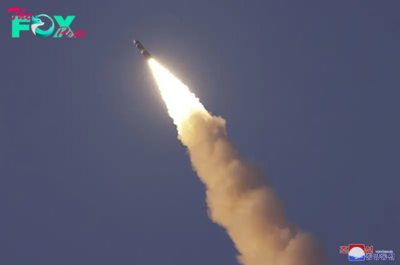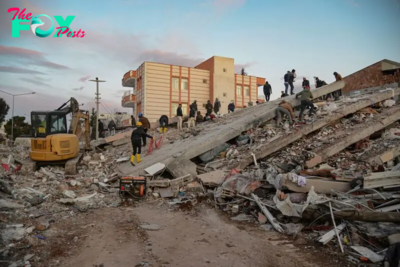World News
S. Korea sees easing disruption as truckers' strike extends
SEOUL, South Korea -- Officials say South Korea’s economy is recovering from the initial shock of a nationwide walkout staged by thousands of cargo truckers, even as their strike reached its 14th day on Wednesday amid a stalemate with the government over freight fare issues.
The conservative government of President Yoon Suk Yeol has taken aggressive steps to defuse the impact of the strike, issuing contentious back-to-work orders to more than 2,000 drivers of cement trucks among broader groups of truckers participating in the walkout. Officials have also mobilized around 200 military vehicles, including container and fuel trucks, to ease the delays in industrial shipments.
Yoon’s office has warned of stronger steps, such as expanding the so-called “work start” orders to other groups of truckers, including those transporting fuel and steel, blaming the strikers for costing the economy more than 3.5 trillion won ($2.6 billion) in a moment of global uncertainty.
The strike’s impact has so far been mostly limited to domestic industries, such as construction, and there have been no immediate signs of meaningful disruption in major export Businesses such as semiconductors.
Container traffic at the country’s major ports is essentially back to normal and reached 126% of pre-strike levels during the busier evening hours from 7 p.m. to midnight Tuesday, according to data from the Ministry of Land, Infrastructure and Transport. Shipments of cement were also reaching 88% of normal levels, easing the disruption at construction sites.
The ministry said around 4,700 truckers were actively participating in the strike on Wednesday, down from 8,000 to 10,000 workers who participated during the early days of the strike, which began on Nov. 24.
Government officials and police have sent teams nationwide to check whether cement truckers were abiding by the back-to-work orders after receiving them in writing and confirmed that so far at least 475 of them had returned to their jobs, the ministry said.
Police are investigating one strike participant accused of assaulting a non-union trucker and throwing eggs at his vehicle at a port in the city of Busan as they clamp down on unionists who threaten or disrupt colleagues who choose to work.
The strikers, represented by the Cargo Truckers Solidarity union, are demanding the government to make permanent a minimum freight rate system that is to expire at the end of 2022, which they say is crucial for safety and financial stability in the face of rising fuel costs and interest rates.
While the minimum fares currently apply only to shipping containers and cement, the strikers are also calling for the benefits to be expanded to other cargo, including oil and chemical tankers, steel and automobile carriers and package delivery trucks.
Yoon’s government had offered to expand the current scheme for another three years but has so far rejected calls to widen the scope of minimum rates. Truckers say the system is crucial for their finances and personal safety, saying they would otherwise be forced to increase their deliveries and drive faster to make ends meet.
South Korean labor groups have requested the International Labor Organization to review whether the government order forcing cement truckers back to their jobs breaches their basic rights for collective action. The order, which was issued last Tuesday, marked the first time a South Korean government exercised its controversial powers under a law revised in 2004 to force truckers back to work.
A failure to comply without “justifiable reason” is punishable by up to three years in jail or a maximum fine of 30 million won ($22,800), and critics say the law infringes on constitutional rights because it clearly doesn’t spell out what would qualify as acceptable conditions for a strike.
The Ministry of Employment and Labor has confirmed that the U.N. agency sent a letter under the name of Corinne Vargha, its director of international labor standards, requesting the South Korean government to clarify its stance over the dispute.
At a regional ILO meeting in Singapore on Wednesday, South Korean Deputy Labor Minister Park Jong-Pil insisted that the back-to-work order was an “inevitable” step, considering its impact on the national economy. He criticized the workers for “holding hostage the national economy and livelihoods” and said the strike was hurting low-income earners and small Businesses the most.
-

 World News23h ago
World News23h agoNorth Korea Fires Multiple Missile Tests in Show of Force on U.S. Election Day
-

 World News1d ago
World News1d agoIsrael-Hezbollah Conflict Death Toll in Lebanon Surpasses 3,000 in 13 Months
-

 World News2d ago
World News2d agoHow AI Is Being Used to Respond to Natural Disasters in Cities
-

 World News2d ago
World News2d agoGermany’s Top Diplomat Is in Kyiv as Ukraine Braces for Impact of U.S. Election on the War
-

 World News2d ago
World News2d agoWhat to Know About the Unprecedented Floods That Killed More Than 200 in Spain
-

 World News2d ago
World News2d agoVolcanic Eruptions in Indonesia Kill at Least 10
-

 World News2d ago
World News2d agoMoldova’s Pro-West President Wins Elections Overshadowed by Russian Meddling Allegations
-

 World News2d ago
World News2d agoIran’s Supreme Leader Threatens Israel and U.S. With ‘a Crushing Response’ Over Israeli Attack



























